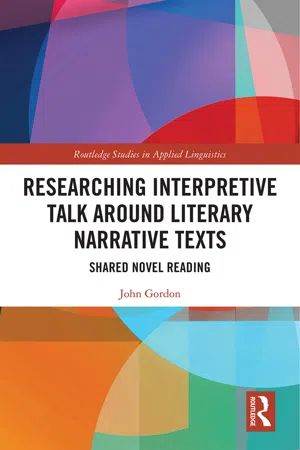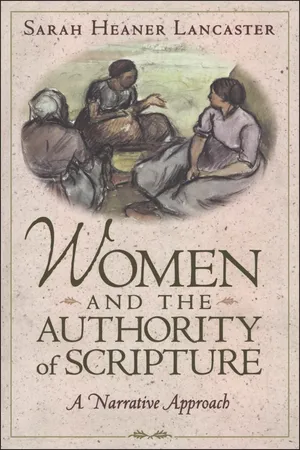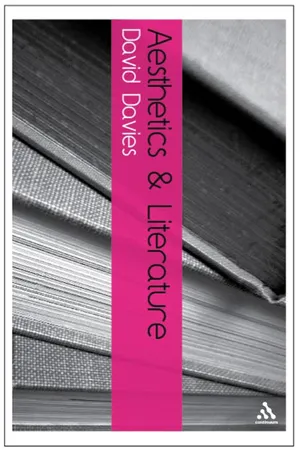Literature
Novel
A novel is a fictional narrative that typically explores characters, plot, and themes in depth. It is a longer form of storytelling compared to short stories and novellas, allowing for more complex development of the narrative and characters. Novels can encompass a wide range of genres and styles, making them a versatile and popular form of literary expression.
Written by Perlego with AI-assistance
Related key terms
1 of 5
3 Key excerpts on "Novel"
- eBook - ePub
Researching Interpretive Talk Around Literary Narrative Texts
Shared Novel Reading
- John Gordon(Author)
- 2020(Publication Date)
- Routledge(Publisher)
The subtle possibilities of narration from the perspective of a narrator offer the reader myriad opportunities for subjective response, from empathy through circumspection to credulity and evaluation. In considering how narrators frame their stories and in judging the veracity of their version of events, readers of Novels enter into ontological and epistemological reflection not simply relative to the narrator’s expression in the text but also as they articulate their own perception. The Novel thus constitutes a powerful educational device where students of literature enter such a dialogue: each Novel offers a sounding board for exploring and articulating what it means to say, to know and to be. Narrative voice in the Novel often takes a form akin to the mundane (in the sense of daily, not pejoratively) expressions of our lives, as we recount experiences and attempt to convey to others our subjectivity in relation to their own, and as our subjectivity enters the public sphere in verbal anecdote, gossip and explanation. Where Novelists such as Thackeray and Dickens deploy omniscient narration, or where Henry James gives us access to the point of view of individual characters, we can attempt nuanced thinking about what it means to be someone else. The work of later Novelists makes us acutely aware of the difficulties of conveying experience in language and narrative form, as in the work of Woolf, Joyce and Faulkner and their use ‘stream of consciousness’. In their innovations these writers and many since have drawn our attention to the formulaic nature of conventional narrative forms and their construction.3.3 Novels in Education
The persistent study of Novels in formal education may seem bizarre in an era where the Novel is sometimes considered a dying or ailing form, the form no more than a ‘tissue of signs’ (Barthes, 1977, p. 146). The purported residing importance of the Novel in society is expressed in the assertion that ‘the history of the Novel and the history of the modern subject are, quite literally, one and the same’ (Armstrong, 2005, p. 3) and in the assumption that ‘the Novel participates in all sorts of social processes, helping to found the modern nation, to consolidate overseas empires, to advance industrial capitalism, to enforce sexual difference, and, more generally to produce and police the subject’ (Ortiz-Robles, 2010, p.2).The Novel form may also be considered an expression of situated knowledge. The literariness of literary fiction rests on authors’ ability to realise original, unique worlds and ways of knowing in narratives that somehow resonate for readers. The Novel is an aesthetic device which invites readers to orient to ontologies inherent in narrative voice, concurrently offering distinctive ways of knowing, epistemology by story. The pedagogy of shared Novel reading shapes for student readers a distinctive ontology, situating their dialogic relationships with narratives in the space of the classroom (Wells, 1999). Texts are voiced and heard as well as decoded from the page. Interactive mediation realises the compelling momentum of episodic narratives, fostering students’ emotional development through empathetic response to represented experiences and psychologies of characters and narrators (Harding, 1962; Meek & Watson, 2003; Spencer, 1982, p. 21; Spencer, Warlow, & Barton, 1977, p. 112). Such mediation realises reading that Rosenblatt (1978) considered both ‘aesthetic’ and ‘transactional’, where readers ‘to some extent create’ texts even as they are guided by them (p. 119). Rosenblatt challenged the assumption that the ‘author’s reconstructed intention’ (p. 113) is the only meaning of a text read aesthetically. - eBook - PDF
Women and the Authority of Scripture
A Narrative Approach
- Sarah Heaner Lancaster(Author)
- 2002(Publication Date)
- Trinity Press International(Publisher)
Narrative is often used to identify a genre of literature that is distinct from other genres. It is generally recognized that narrative is prose rather than 98 NARRATIVE IN HUMAN LIFE 99 poetry, but beyond that simple description is little consensus about what kind of prose narrative is. Narrative may be identified as a work with a plot, but epic poems and sometimes other forms of poetry have plots also. Further-more, not all works with plots (a drama, a film) fall under the category of narrative as it is usually conceived in literary studies because they show rather than tell. Robert Scholes and Robert Kellogg, however, treat film as a form of telling because the director narrates through choices of how to present events. They do not consider drama to be such a telling because mem-bers of the audience have the freedom to look at many different things on the stage. As Gerard Genette uses it, the word narrative refers, not to a genre, but to one of three levels within a single work. In his usage, story refers to events (real or fictitious), narrative refers to the oral or written statements that tell about those events, and narrating refers to the act of telling itself. 1 Although most often plot is considered an essential ingredient of narrative, the two terms can also be distinguished, so that under one possible view narrative states temporal events (The king died, and then the queen died) while plot shows the causal relation between those events (The king died, and then the queen died of grief). 2 Even in the field that studies it the most, narrative turns out to be a slippery term. What does seem to be clear in literary studies is that narrative must recount an event or events (real or fictitious); otherwise, the prose is merely description. Although narrative has been conceived in a variety of ways, the role of events provides a starting point for identifying the way that a narrative works. - eBook - PDF
- David Davies(Author)
- 2007(Publication Date)
- Continuum(Publisher)
What is literature? As with many philosophical questions, it may seem at first glance easy to provide an answer. Literature, after all, is something a lot of us claim to enjoy and to spend our time reading, and upon whose virtues we are prepared to expound at length at parties if given half the chance. Literature is the plays of Shake-speare and Molière, the Novels and short stories of Tolstoy, Dos-toevsky, and Jane Austen, the poetry of T. S. Eliot, Coleridge, and Rilke . . . We could go on, but someone interrupts us by adding some of their own favourite examples: ‘– the Bible, Gibbon’s Decline and Fall , Hume’s History of England , Boswell’s Life of Johnson –’ And another voice pipes in: ‘– and the James Bond Novels, and Harlequin Romances, and Superman comics –’ And then one more voice seeking to put an end to all of this nonsense: ‘– and the manual for my computer, and gardening books, and the Highway Code – they’re all literature!’ We want to object that these things are not all literature in the sense we had in mind when we introduced the topic. Our conversa-tional partners, we protest, are wrong to classify all of the things they mention as literature. But we are soon forced to withdraw the accu-sation of misuse of the term ‘literature’, for all of the things they have cited are correctly described as literature in certain linguistic contexts. So now we must try to distinguish different senses in which something can rightly be said to be literature, corresponding to the different kinds of discursive contexts to which our partners have appealed. Were we able to prevail upon them to remain as Socratic interlocutors in a further examination of these issues, how should we proceed? We should begin by granting that the term ‘literature’ has at least three different senses. In what we might term the broad sense, ‘liter-ature’ refers to any body of writing that has a shared topic.
Index pages curate the most relevant extracts from our library of academic textbooks. They’ve been created using an in-house natural language model (NLM), each adding context and meaning to key research topics.


